A Qualitative Analysis of Antecedents of Entrepreneurial Self-Efficacy
VerifiedAdded on 2023/06/11
|8
|1511
|170
Case Study
AI Summary
This case study employs a qualitative analysis, using unstructured interviews and thematic analysis, to investigate the antecedents of entrepreneurial self-efficacy. The study explores individual, firm, and macro-level factors influencing entrepreneurial ventures. Findings reveal varying levels of understanding among respondents regarding the concept and its associated factors. The reflection discusses the challenges encountered during interviews and analysis, including limited respondent knowledge and data insufficiency. The study acknowledges limitations such as time constraints, potential biases, and the unscientific nature of the analytical approach. It provides insights into the complexities of entrepreneurial self-efficacy and its dependence on multiple factors. Desklib offers similar resources for students.

Applying a qualitative
analysis to a current
business concept
analysis to a current
business concept
Paraphrase This Document
Need a fresh take? Get an instant paraphrase of this document with our AI Paraphraser
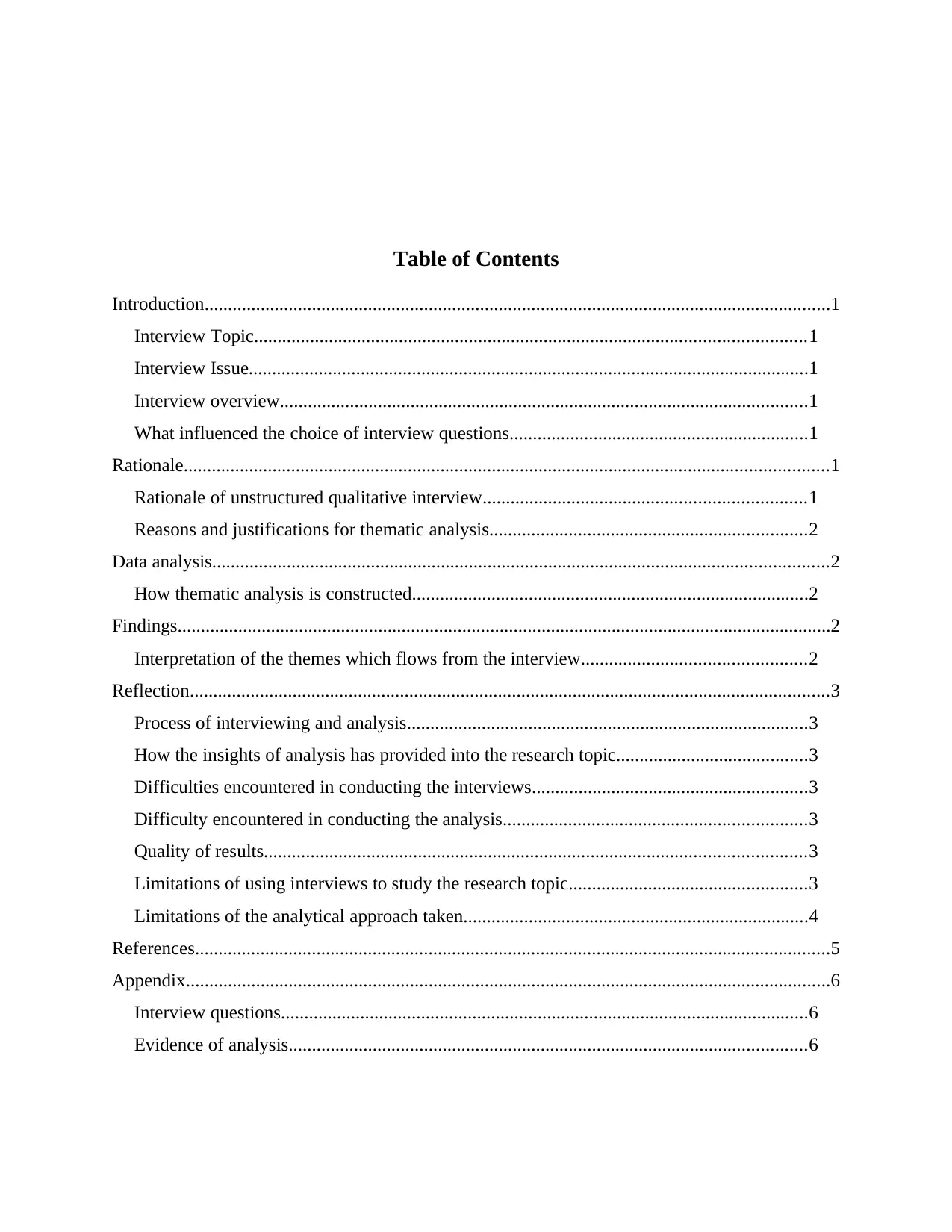
Table of Contents
Introduction......................................................................................................................................1
Interview Topic......................................................................................................................1
Interview Issue........................................................................................................................1
Interview overview.................................................................................................................1
What influenced the choice of interview questions................................................................1
Rationale..........................................................................................................................................1
Rationale of unstructured qualitative interview.....................................................................1
Reasons and justifications for thematic analysis....................................................................2
Data analysis....................................................................................................................................2
How thematic analysis is constructed.....................................................................................2
Findings............................................................................................................................................2
Interpretation of the themes which flows from the interview................................................2
Reflection.........................................................................................................................................3
Process of interviewing and analysis......................................................................................3
How the insights of analysis has provided into the research topic.........................................3
Difficulties encountered in conducting the interviews...........................................................3
Difficulty encountered in conducting the analysis.................................................................3
Quality of results....................................................................................................................3
Limitations of using interviews to study the research topic...................................................3
Limitations of the analytical approach taken..........................................................................4
References........................................................................................................................................5
Appendix..........................................................................................................................................6
Interview questions.................................................................................................................6
Evidence of analysis...............................................................................................................6
Introduction......................................................................................................................................1
Interview Topic......................................................................................................................1
Interview Issue........................................................................................................................1
Interview overview.................................................................................................................1
What influenced the choice of interview questions................................................................1
Rationale..........................................................................................................................................1
Rationale of unstructured qualitative interview.....................................................................1
Reasons and justifications for thematic analysis....................................................................2
Data analysis....................................................................................................................................2
How thematic analysis is constructed.....................................................................................2
Findings............................................................................................................................................2
Interpretation of the themes which flows from the interview................................................2
Reflection.........................................................................................................................................3
Process of interviewing and analysis......................................................................................3
How the insights of analysis has provided into the research topic.........................................3
Difficulties encountered in conducting the interviews...........................................................3
Difficulty encountered in conducting the analysis.................................................................3
Quality of results....................................................................................................................3
Limitations of using interviews to study the research topic...................................................3
Limitations of the analytical approach taken..........................................................................4
References........................................................................................................................................5
Appendix..........................................................................................................................................6
Interview questions.................................................................................................................6
Evidence of analysis...............................................................................................................6
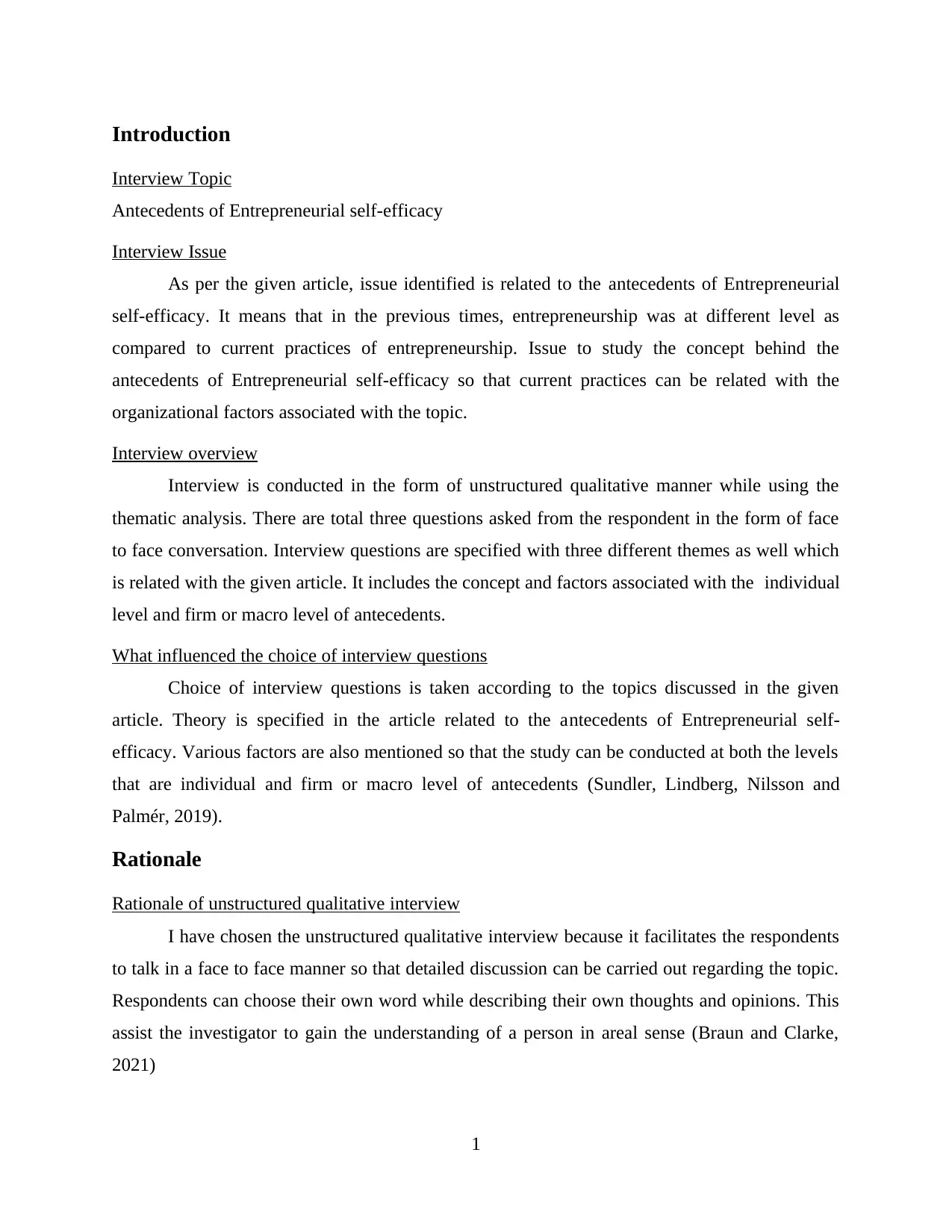
Introduction
Interview Topic
Antecedents of Entrepreneurial self-efficacy
Interview Issue
As per the given article, issue identified is related to the antecedents of Entrepreneurial
self-efficacy. It means that in the previous times, entrepreneurship was at different level as
compared to current practices of entrepreneurship. Issue to study the concept behind the
antecedents of Entrepreneurial self-efficacy so that current practices can be related with the
organizational factors associated with the topic.
Interview overview
Interview is conducted in the form of unstructured qualitative manner while using the
thematic analysis. There are total three questions asked from the respondent in the form of face
to face conversation. Interview questions are specified with three different themes as well which
is related with the given article. It includes the concept and factors associated with the individual
level and firm or macro level of antecedents.
What influenced the choice of interview questions
Choice of interview questions is taken according to the topics discussed in the given
article. Theory is specified in the article related to the antecedents of Entrepreneurial self-
efficacy. Various factors are also mentioned so that the study can be conducted at both the levels
that are individual and firm or macro level of antecedents (Sundler, Lindberg, Nilsson and
Palmér, 2019).
Rationale
Rationale of unstructured qualitative interview
I have chosen the unstructured qualitative interview because it facilitates the respondents
to talk in a face to face manner so that detailed discussion can be carried out regarding the topic.
Respondents can choose their own word while describing their own thoughts and opinions. This
assist the investigator to gain the understanding of a person in areal sense (Braun and Clarke,
2021)
1
Interview Topic
Antecedents of Entrepreneurial self-efficacy
Interview Issue
As per the given article, issue identified is related to the antecedents of Entrepreneurial
self-efficacy. It means that in the previous times, entrepreneurship was at different level as
compared to current practices of entrepreneurship. Issue to study the concept behind the
antecedents of Entrepreneurial self-efficacy so that current practices can be related with the
organizational factors associated with the topic.
Interview overview
Interview is conducted in the form of unstructured qualitative manner while using the
thematic analysis. There are total three questions asked from the respondent in the form of face
to face conversation. Interview questions are specified with three different themes as well which
is related with the given article. It includes the concept and factors associated with the individual
level and firm or macro level of antecedents.
What influenced the choice of interview questions
Choice of interview questions is taken according to the topics discussed in the given
article. Theory is specified in the article related to the antecedents of Entrepreneurial self-
efficacy. Various factors are also mentioned so that the study can be conducted at both the levels
that are individual and firm or macro level of antecedents (Sundler, Lindberg, Nilsson and
Palmér, 2019).
Rationale
Rationale of unstructured qualitative interview
I have chosen the unstructured qualitative interview because it facilitates the respondents
to talk in a face to face manner so that detailed discussion can be carried out regarding the topic.
Respondents can choose their own word while describing their own thoughts and opinions. This
assist the investigator to gain the understanding of a person in areal sense (Braun and Clarke,
2021)
1
⊘ This is a preview!⊘
Do you want full access?
Subscribe today to unlock all pages.

Trusted by 1+ million students worldwide
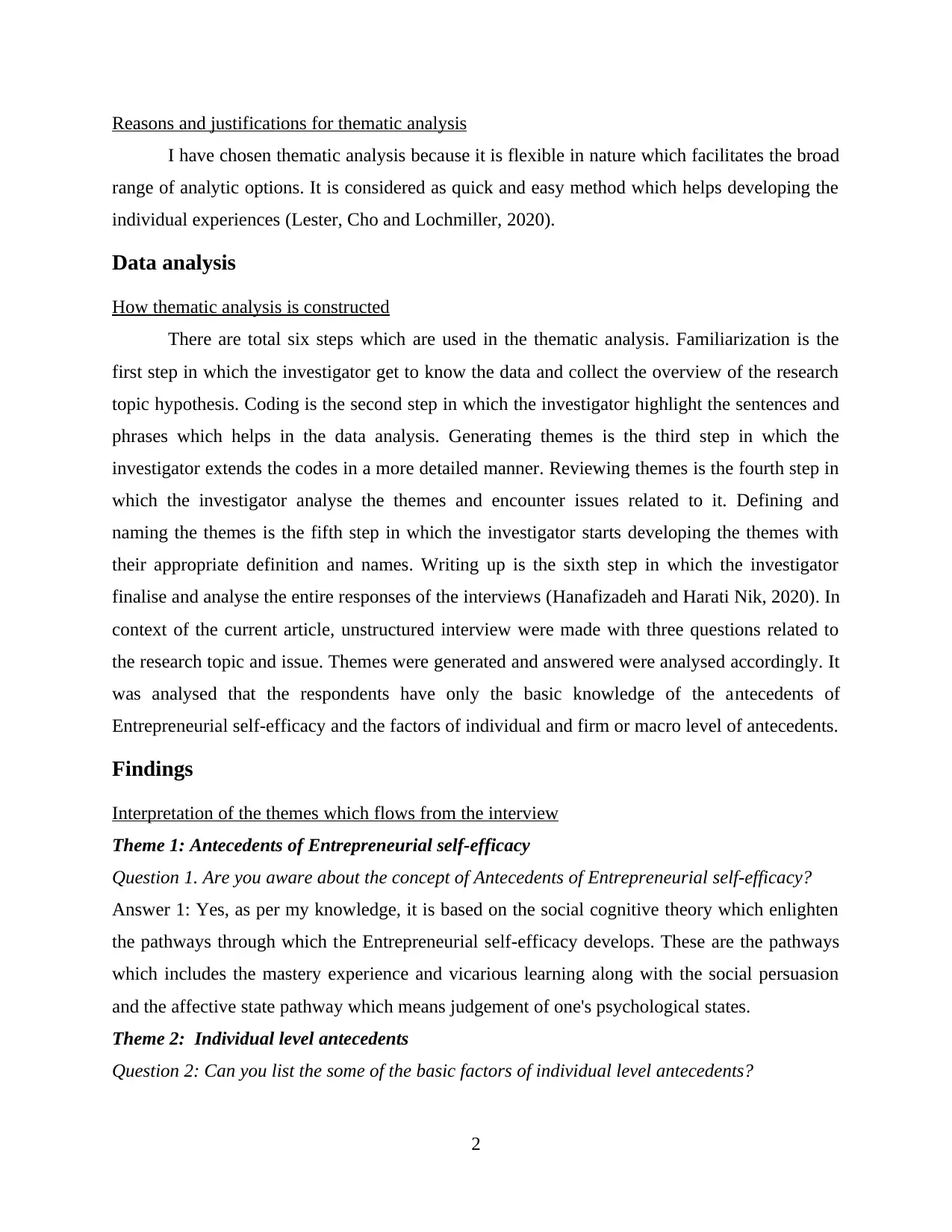
Reasons and justifications for thematic analysis
I have chosen thematic analysis because it is flexible in nature which facilitates the broad
range of analytic options. It is considered as quick and easy method which helps developing the
individual experiences (Lester, Cho and Lochmiller, 2020).
Data analysis
How thematic analysis is constructed
There are total six steps which are used in the thematic analysis. Familiarization is the
first step in which the investigator get to know the data and collect the overview of the research
topic hypothesis. Coding is the second step in which the investigator highlight the sentences and
phrases which helps in the data analysis. Generating themes is the third step in which the
investigator extends the codes in a more detailed manner. Reviewing themes is the fourth step in
which the investigator analyse the themes and encounter issues related to it. Defining and
naming the themes is the fifth step in which the investigator starts developing the themes with
their appropriate definition and names. Writing up is the sixth step in which the investigator
finalise and analyse the entire responses of the interviews (Hanafizadeh and Harati Nik, 2020). In
context of the current article, unstructured interview were made with three questions related to
the research topic and issue. Themes were generated and answered were analysed accordingly. It
was analysed that the respondents have only the basic knowledge of the antecedents of
Entrepreneurial self-efficacy and the factors of individual and firm or macro level of antecedents.
Findings
Interpretation of the themes which flows from the interview
Theme 1: Antecedents of Entrepreneurial self-efficacy
Question 1. Are you aware about the concept of Antecedents of Entrepreneurial self-efficacy?
Answer 1: Yes, as per my knowledge, it is based on the social cognitive theory which enlighten
the pathways through which the Entrepreneurial self-efficacy develops. These are the pathways
which includes the mastery experience and vicarious learning along with the social persuasion
and the affective state pathway which means judgement of one's psychological states.
Theme 2: Individual level antecedents
Question 2: Can you list the some of the basic factors of individual level antecedents?
2
I have chosen thematic analysis because it is flexible in nature which facilitates the broad
range of analytic options. It is considered as quick and easy method which helps developing the
individual experiences (Lester, Cho and Lochmiller, 2020).
Data analysis
How thematic analysis is constructed
There are total six steps which are used in the thematic analysis. Familiarization is the
first step in which the investigator get to know the data and collect the overview of the research
topic hypothesis. Coding is the second step in which the investigator highlight the sentences and
phrases which helps in the data analysis. Generating themes is the third step in which the
investigator extends the codes in a more detailed manner. Reviewing themes is the fourth step in
which the investigator analyse the themes and encounter issues related to it. Defining and
naming the themes is the fifth step in which the investigator starts developing the themes with
their appropriate definition and names. Writing up is the sixth step in which the investigator
finalise and analyse the entire responses of the interviews (Hanafizadeh and Harati Nik, 2020). In
context of the current article, unstructured interview were made with three questions related to
the research topic and issue. Themes were generated and answered were analysed accordingly. It
was analysed that the respondents have only the basic knowledge of the antecedents of
Entrepreneurial self-efficacy and the factors of individual and firm or macro level of antecedents.
Findings
Interpretation of the themes which flows from the interview
Theme 1: Antecedents of Entrepreneurial self-efficacy
Question 1. Are you aware about the concept of Antecedents of Entrepreneurial self-efficacy?
Answer 1: Yes, as per my knowledge, it is based on the social cognitive theory which enlighten
the pathways through which the Entrepreneurial self-efficacy develops. These are the pathways
which includes the mastery experience and vicarious learning along with the social persuasion
and the affective state pathway which means judgement of one's psychological states.
Theme 2: Individual level antecedents
Question 2: Can you list the some of the basic factors of individual level antecedents?
2
Paraphrase This Document
Need a fresh take? Get an instant paraphrase of this document with our AI Paraphraser
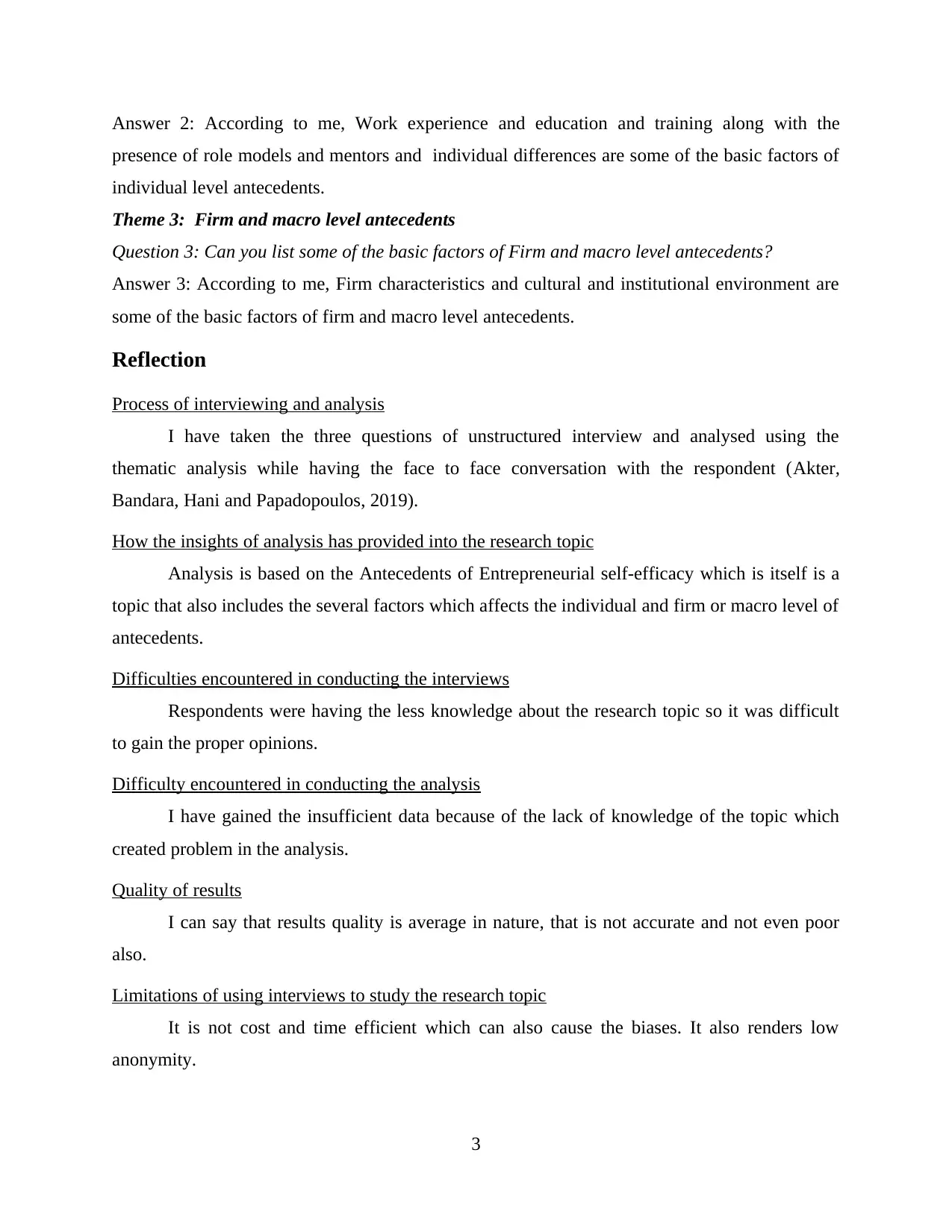
Answer 2: According to me, Work experience and education and training along with the
presence of role models and mentors and individual differences are some of the basic factors of
individual level antecedents.
Theme 3: Firm and macro level antecedents
Question 3: Can you list some of the basic factors of Firm and macro level antecedents?
Answer 3: According to me, Firm characteristics and cultural and institutional environment are
some of the basic factors of firm and macro level antecedents.
Reflection
Process of interviewing and analysis
I have taken the three questions of unstructured interview and analysed using the
thematic analysis while having the face to face conversation with the respondent (Akter,
Bandara, Hani and Papadopoulos, 2019).
How the insights of analysis has provided into the research topic
Analysis is based on the Antecedents of Entrepreneurial self-efficacy which is itself is a
topic that also includes the several factors which affects the individual and firm or macro level of
antecedents.
Difficulties encountered in conducting the interviews
Respondents were having the less knowledge about the research topic so it was difficult
to gain the proper opinions.
Difficulty encountered in conducting the analysis
I have gained the insufficient data because of the lack of knowledge of the topic which
created problem in the analysis.
Quality of results
I can say that results quality is average in nature, that is not accurate and not even poor
also.
Limitations of using interviews to study the research topic
It is not cost and time efficient which can also cause the biases. It also renders low
anonymity.
3
presence of role models and mentors and individual differences are some of the basic factors of
individual level antecedents.
Theme 3: Firm and macro level antecedents
Question 3: Can you list some of the basic factors of Firm and macro level antecedents?
Answer 3: According to me, Firm characteristics and cultural and institutional environment are
some of the basic factors of firm and macro level antecedents.
Reflection
Process of interviewing and analysis
I have taken the three questions of unstructured interview and analysed using the
thematic analysis while having the face to face conversation with the respondent (Akter,
Bandara, Hani and Papadopoulos, 2019).
How the insights of analysis has provided into the research topic
Analysis is based on the Antecedents of Entrepreneurial self-efficacy which is itself is a
topic that also includes the several factors which affects the individual and firm or macro level of
antecedents.
Difficulties encountered in conducting the interviews
Respondents were having the less knowledge about the research topic so it was difficult
to gain the proper opinions.
Difficulty encountered in conducting the analysis
I have gained the insufficient data because of the lack of knowledge of the topic which
created problem in the analysis.
Quality of results
I can say that results quality is average in nature, that is not accurate and not even poor
also.
Limitations of using interviews to study the research topic
It is not cost and time efficient which can also cause the biases. It also renders low
anonymity.
3

Limitations of the analytical approach taken
It requires a lot of time and a skilled interviewer. It also lacks reliability which is
unscientific in nature.
4
It requires a lot of time and a skilled interviewer. It also lacks reliability which is
unscientific in nature.
4
⊘ This is a preview!⊘
Do you want full access?
Subscribe today to unlock all pages.

Trusted by 1+ million students worldwide
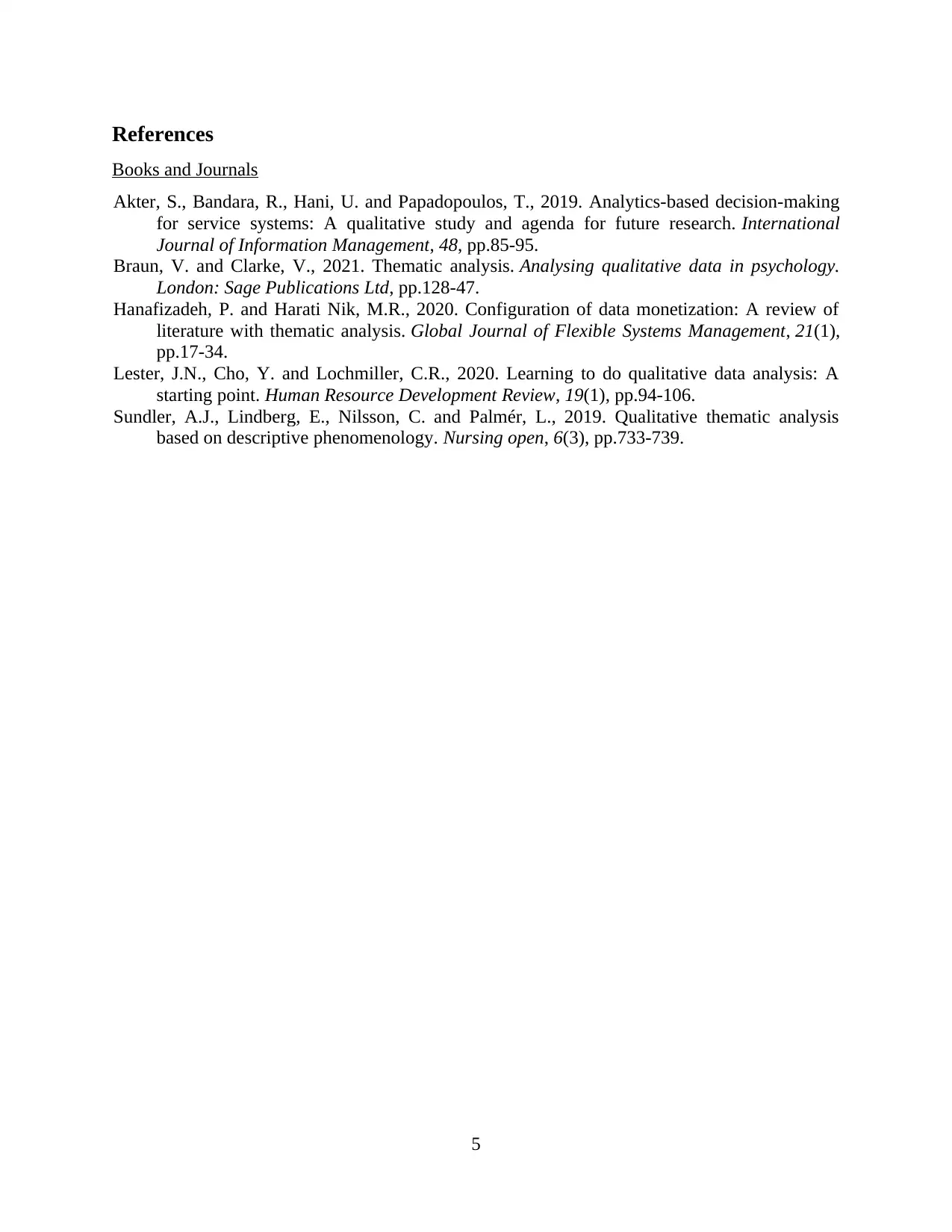
References
Books and Journals
Akter, S., Bandara, R., Hani, U. and Papadopoulos, T., 2019. Analytics-based decision-making
for service systems: A qualitative study and agenda for future research. International
Journal of Information Management, 48, pp.85-95.
Braun, V. and Clarke, V., 2021. Thematic analysis. Analysing qualitative data in psychology.
London: Sage Publications Ltd, pp.128-47.
Hanafizadeh, P. and Harati Nik, M.R., 2020. Configuration of data monetization: A review of
literature with thematic analysis. Global Journal of Flexible Systems Management, 21(1),
pp.17-34.
Lester, J.N., Cho, Y. and Lochmiller, C.R., 2020. Learning to do qualitative data analysis: A
starting point. Human Resource Development Review, 19(1), pp.94-106.
Sundler, A.J., Lindberg, E., Nilsson, C. and Palmér, L., 2019. Qualitative thematic analysis
based on descriptive phenomenology. Nursing open, 6(3), pp.733-739.
5
Books and Journals
Akter, S., Bandara, R., Hani, U. and Papadopoulos, T., 2019. Analytics-based decision-making
for service systems: A qualitative study and agenda for future research. International
Journal of Information Management, 48, pp.85-95.
Braun, V. and Clarke, V., 2021. Thematic analysis. Analysing qualitative data in psychology.
London: Sage Publications Ltd, pp.128-47.
Hanafizadeh, P. and Harati Nik, M.R., 2020. Configuration of data monetization: A review of
literature with thematic analysis. Global Journal of Flexible Systems Management, 21(1),
pp.17-34.
Lester, J.N., Cho, Y. and Lochmiller, C.R., 2020. Learning to do qualitative data analysis: A
starting point. Human Resource Development Review, 19(1), pp.94-106.
Sundler, A.J., Lindberg, E., Nilsson, C. and Palmér, L., 2019. Qualitative thematic analysis
based on descriptive phenomenology. Nursing open, 6(3), pp.733-739.
5
Paraphrase This Document
Need a fresh take? Get an instant paraphrase of this document with our AI Paraphraser
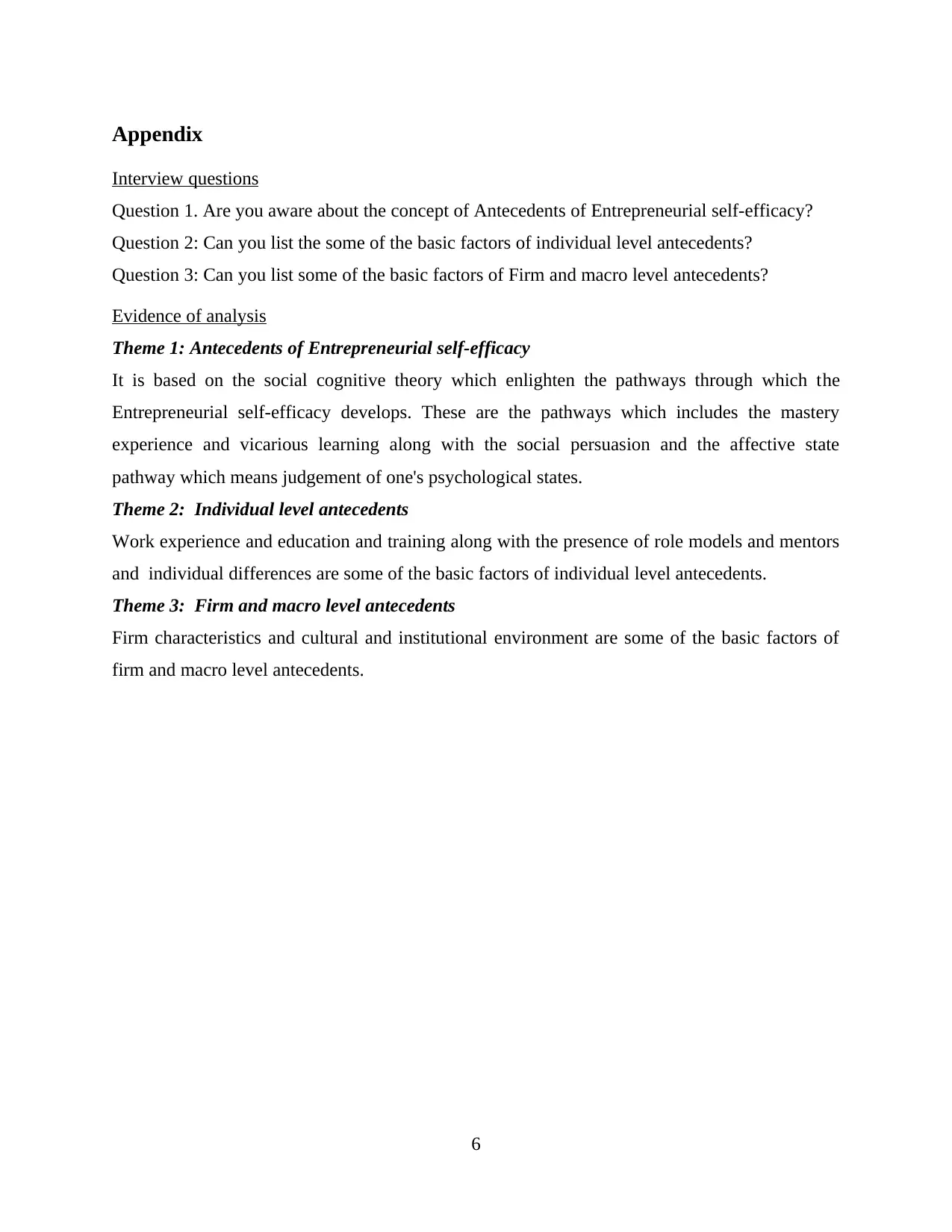
Appendix
Interview questions
Question 1. Are you aware about the concept of Antecedents of Entrepreneurial self-efficacy?
Question 2: Can you list the some of the basic factors of individual level antecedents?
Question 3: Can you list some of the basic factors of Firm and macro level antecedents?
Evidence of analysis
Theme 1: Antecedents of Entrepreneurial self-efficacy
It is based on the social cognitive theory which enlighten the pathways through which the
Entrepreneurial self-efficacy develops. These are the pathways which includes the mastery
experience and vicarious learning along with the social persuasion and the affective state
pathway which means judgement of one's psychological states.
Theme 2: Individual level antecedents
Work experience and education and training along with the presence of role models and mentors
and individual differences are some of the basic factors of individual level antecedents.
Theme 3: Firm and macro level antecedents
Firm characteristics and cultural and institutional environment are some of the basic factors of
firm and macro level antecedents.
6
Interview questions
Question 1. Are you aware about the concept of Antecedents of Entrepreneurial self-efficacy?
Question 2: Can you list the some of the basic factors of individual level antecedents?
Question 3: Can you list some of the basic factors of Firm and macro level antecedents?
Evidence of analysis
Theme 1: Antecedents of Entrepreneurial self-efficacy
It is based on the social cognitive theory which enlighten the pathways through which the
Entrepreneurial self-efficacy develops. These are the pathways which includes the mastery
experience and vicarious learning along with the social persuasion and the affective state
pathway which means judgement of one's psychological states.
Theme 2: Individual level antecedents
Work experience and education and training along with the presence of role models and mentors
and individual differences are some of the basic factors of individual level antecedents.
Theme 3: Firm and macro level antecedents
Firm characteristics and cultural and institutional environment are some of the basic factors of
firm and macro level antecedents.
6
1 out of 8
Related Documents
Your All-in-One AI-Powered Toolkit for Academic Success.
+13062052269
info@desklib.com
Available 24*7 on WhatsApp / Email
![[object Object]](/_next/static/media/star-bottom.7253800d.svg)
Unlock your academic potential
Copyright © 2020–2026 A2Z Services. All Rights Reserved. Developed and managed by ZUCOL.



